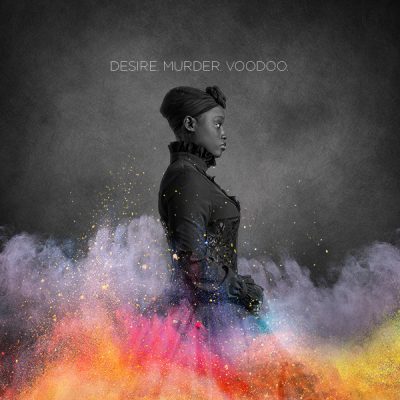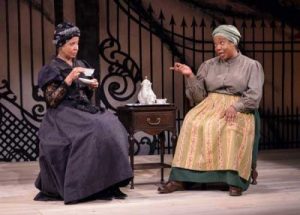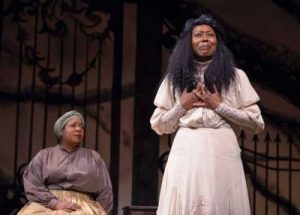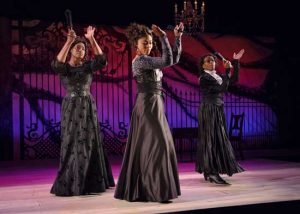
 Recommended *** “The House That Will Not Stand” is a history play about free women of color in 1813 New Orleans. I really expected to be blown away by the play because of the compelling story, the level of talent on stage and the all-female cast. Instead of loving it, I ended up disappointed because I couldn’t hear/understand a lot of the dialogue. I give “The House That Will Not Stand” 3 Spotlights.
Recommended *** “The House That Will Not Stand” is a history play about free women of color in 1813 New Orleans. I really expected to be blown away by the play because of the compelling story, the level of talent on stage and the all-female cast. Instead of loving it, I ended up disappointed because I couldn’t hear/understand a lot of the dialogue. I give “The House That Will Not Stand” 3 Spotlights.
While New Orleans was ruled by Spain and France, free women of color who had been in a relationship – a plaçage – with a wealthy white man were allowed to inherit and/or own property. In fact, upon the death of a protector, the placée and her family could inherit up to a third of his property. Under American law, however, women of color, free or not, couldn’t own property. The Louisiana Purchase meant an American takeover, so many placées were facing dispossession.
After her protector passed away suddenly, Beartice Albans (Lizan Mitchell) is scrambling to keep her home and protect her family. If she can raise enough money, his wife (who inherits under American law) will sell her the house. Her most hated rival, La Veuve (Linda Bright Clay), tries to steal the rings off his corpse. She wants to prove that Beartice killed him, so she pays Makeda (Jacqueline Williams), a slave, to do a voodoo séance to summon his spirit.
The last argument Beartice had with her protector was about the placée ball. He wanted to send the girls to find their own protectors, she refused to let them go because she didn’t want them at the mercy of a man. Two of her daughters, Agnès (Diana Coates) and Maude Lynn (Angela Alise), are furious that they won’t get their chance to attract a protector.
When arguing and begging don’t sway Beartice, they plan to sneak out. Agnès, who is convinced that it’s her turn, convinces Maude Lynn to dress as her mother and negotiate for her. When younger sister, Odette (Aneisa Hicks), threatens to snitch, they tie her to a chair.
Everyone thinks that Beartice’s sister, Marie-Josephine (Penelope Walker), went mad after she lost her lover. Marie-Josephine gets a message from the grave during the above mentioned séance, and goes off to meet her love.
Jacqueline Williams is the brightest light in this cast. Her impassioned speech about freedom almost brought tears to my eyes.
When people behave badly in a theater, they drive me nuts. We had a lot of people behaving badly during this play. In fact, as soon as the lights started to go down, people started screaming (literally), cheering and clapping. They didn’t let up during the show either. Every time someone got snarky, people started laughing so loudly and so long that you couldn’t hear the dialogue. I don’t think opening night audiences realize that that behavior might have a negative effect on the review.
I doubt if the cast expected the reactions they were getting from the opening night audiences because they never waited for the noise/laughter to die down before saying their next lines. They cut off many words, too. Lizan Mitchell was the most difficult to understand, perhaps because her voice is so sharp and discordant.
“The House That Will Not Stand” runs through July 10th at Victory Gardens Biograph Theatre, 2433 N. Lincoln Avenue, Chicago. Running time is 2 hours, 15 minutes, with an intermission.
Performances are:
 Tuesdays through Fridays at 7:30 pm
Tuesdays through Fridays at 7:30 pm
Saturdays at 3:00 and 7:30 pm
and Sundays at 3:00 pm.
Tickets range from $15-$60. Valet parking is available. FYI (773) 871-3000 or www.victorygardens.org.
To see what others are saying, visit www.theatreinchicago.com, go to Review Round-Up and click at “The House That Will Not Stand”






More Stories
“The Joffrey Ballet’s Golden Hour” reviewed by Carol Moore
“Mary Poppins : A Staged Concert” reviewed by Julia W. Rath
” I and You”